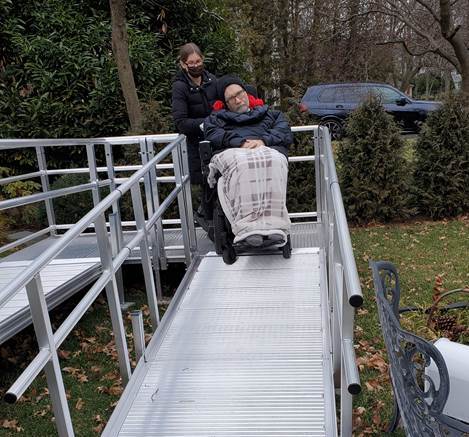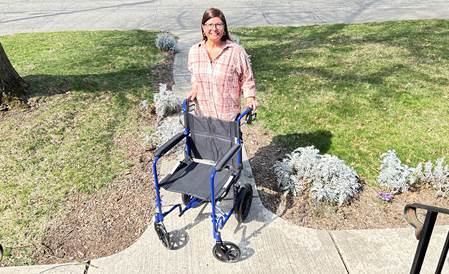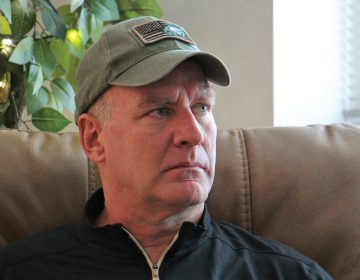‘Shocked and distraught’: N.J. Gov. Murphy’s proposed state spending plan slashes funding for ALS services
Gov. Murphy’s proposed budget cuts funding for ALS services by 66%. The ALS community is incredibly concerned, given how much they rely on state funding.

New Jersey Gov. Phil Murphy delivers his State of the State address to a joint session of the Legislature at the statehouse, in Trenton, N.J., Tuesday, Jan. 9, 2024. (AP Photo/Matt Rourke)
From Philly and the Pa. suburbs to South Jersey and Delaware, what would you like WHYY News to cover? Let us know!
Last year, the New Jersey state budget allocated $1.5 million to organizations that support people living with Amyotrophic Lateral Sclerosis (ALS), also known as Lou Gehrig’s disease, named after the famous baseball player who was diagnosed with it and later died from it. ALS is a progressive, fatal disease affecting the nerve cells in the brain and spinal cord. This year, the governor’s proposed spending plan slashes funding for ALS programs by 66%.
ALS patients, their families and support groups in New Jersey are “shocked and distraught” about the proposed budget cuts.
64-year-old Layne Oliff of Plainfield, New Jersey, was an avid runner and hiker before he got diagnosed with ALS in 2020. In the last four years, the disease confined him to a wheelchair, and he is slowly losing his speech. He said patients like him rely heavily on government aid and programs, and he is disappointed in Gov. Phil Murphy.
“I’m real upset he wants to cut the budget for ALS support, I am. We need help, I’m pissed.”
Oliff said ALS patients need a lot of support to pay for the multiple devices and equipment they need to survive.
Kristen Cocoman, president and CEO of ALS United Greater New York and New Jersey, said this funding cut would be cruel and devastating.
“We are providing items such as communication devices, wheelchairs, all kinds of assistive technology and augmentative equipment,” she said. “We simply just can’t ignore losing a million dollars in funding without drastically reducing some of our services. I’m shocked and disappointed.”

Cocoman said her organization relies on state funding to pay for specialized medical clinics for nurses and social workers, and grants for ALS patients to modify their homes to fit their needs.
“We have found that some people are confined to their home because they simply do not have the funds to install a ramp to get in and out of the home, and that can mean lack of access to the medical community because they can’t get to the doctors,” she said. “And they can’t participate in family events because they are locked into their homes.”
Cocoman said if the government slashes funding, families will be left burdened. “That’s an unacceptable situation and scenario. We can’t go backwards now,” she said.
According to the CDC, in 2017 — the latest data available — 31,000 patients were living with ALS in the United States. The CDC website said, on average, 5,000 new patients are diagnosed with the disease annually. Right now, there is no cure for ALS, and only a few modest treatments have been developed.
Cocoman said approximately 500 people are living with ALS in New Jersey.
“On average, it is two to five years that you will live with the disease; some live a shorter time frame, and some live much longer,” she said.

She said the average age of onset of ALS is in the 40s and 50s, but because of awareness, people are getting diagnosed much earlier.
Oliff, the Plainfield resident, used to own a health care communications business before he got sick. He had to sell off his business when he became unwell.
Oliff said many ALS patients are on fixed incomes with limited means, and cutting funding will make their lives and the lives of their family members worse.
“Any help we can get is appreciated immensely, that’s what I would tell Gov. Murphy,” he said. “Every day, I wake up and say, ‘What can I do today to get through the day?’ We’re fighting a real uphill battle here; anything that can help us is really appreciated.”
A spokesperson for the Governor says he looks forward “to continued budget negotiations with the Legislature to deliver a budget that prioritizes balancing the responsibility of spending within our means – while stretching every dollar to lift up our neighbors in need.”
You can get more information about ALS by calling 212-619-1400.

Get daily updates from WHYY News!
WHYY is your source for fact-based, in-depth journalism and information. As a nonprofit organization, we rely on financial support from readers like you. Please give today.






